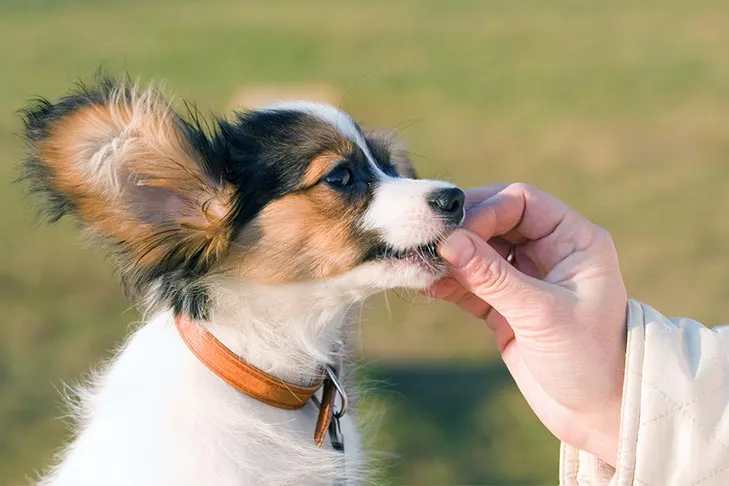Many dog owners wonder, “What People Food Can Dogs Eat?” Sharing our meals with our beloved canine companions can be a rewarding experience, but it’s crucial to know which human foods are safe and beneficial, and which could be harmful. While commercial dog food is formulated to provide complete nutrition, occasionally offering certain human foods as treats or supplements can add variety and extra nutrients to your dog’s diet. However, moderation and proper preparation are key to ensuring your dog’s health and safety.
Before introducing any new human food to your dog, it’s always best to consult with your veterinarian, especially if your dog has allergies, sensitive digestion, or any underlying health conditions. Remember that treats, including human foods, should never make up more than 10% of your dog’s daily caloric intake to prevent nutritional imbalances and weight gain. To ensure your dog’s well-being, it’s equally important to know what you should never feed your dog and prioritize their safety above all.
Safe Human Foods for Dogs
Here’s a detailed look at common human foods that are generally safe for dogs, along with important considerations for each:
Bread
Small quantities of plain, cooked bread are generally safe for dogs. It offers no significant nutritional benefits but won’t typically cause harm if given occasionally. Ensure it contains no harmful additives like spices, garlic, onions, or especially raisins, which are highly toxic to dogs. Homemade bread is often a safer choice than store-bought varieties, which can contain preservatives. However, bread is high in carbohydrates and calories, so it should be given sparingly to avoid weight gain. Never give raw dough, as yeast can expand in your dog’s stomach, causing pain and potentially alcohol poisoning.
Cashews
Cashews can be a healthy snack for dogs in strict moderation. They contain beneficial nutrients like calcium, magnesium, antioxidants, and protein. However, cashews are high in fat, and too many can lead to an upset stomach, pancreatitis, or weight gain over time. Always offer unsalted, unroasted cashews and only a few at a time as an occasional treat. Ensure they are free from any seasonings or coatings.
Cheese
Most dogs adore cheese, and it can be a delightful treat when given in small to moderate amounts. For dogs that aren’t lactose intolerant (which is possible but less common than in humans), cheese provides protein and calcium. Opt for lower-fat varieties like cottage cheese or mozzarella to avoid excessive fat intake, which can lead to digestive issues or pancreatitis. Always ensure the cheese is plain and free from additives like garlic, onion, or chives. Many specialized dog chews are also made from dried cheese, offering a safe and enjoyable option.
 All American Dog resting its head on the kitchen table looking at a block of cheese.
All American Dog resting its head on the kitchen table looking at a block of cheese.
Coconut
Coconut in small amounts can offer some benefits due to its lauric acid content, which has antimicrobial properties. It may help with bad breath and certain skin conditions like hot spots or flea allergies. Coconut milk and virgin coconut oil are also safe. When feeding fresh coconut, always remove the fibrous outer husk, which can be a choking hazard or cause intestinal obstruction. Introduce coconut slowly to monitor for any digestive upset, as some dogs might be sensitive to its high fat content.
Corn
Corn is a common and safe ingredient found in many commercial dog foods, providing carbohydrates, protein, and antioxidants. If sharing corn from your plate, it must always be removed from the cob. The cob is indigestible and can cause severe intestinal blockages, requiring emergency surgery. Ensure the corn is plain, without butter, salt, or other seasonings. Steamed or boiled kernels are the safest option.
Eggs
Cooked eggs are an excellent source of protein, vitamins, and minerals, making them a fantastic addition to your dog’s diet. They can even help soothe an upset stomach. It is crucial to always cook eggs thoroughly (scrambled, boiled, or fried without oil/butter) to eliminate the risk of salmonella and to avoid biotin deficiency, which can result from consuming raw egg whites. Never add salt, pepper, or other seasonings.
Fish
Certain types of fully cooked fish can be a wonderful, healthy boost for your dog, rich in omega-3 fatty acids, protein, and essential vitamins. Salmon and sardines are particularly beneficial. Salmon is packed with protein and vitamins, while sardines offer calcium due to their soft, digestible bones. However, always ensure fish is thoroughly cooked and all small bones (except for those in canned sardines) are carefully removed, as they can splinter and cause internal injury. Limit fish intake to once or twice a week, and never feed raw or undercooked fish, as it can contain parasites.
Ham
While dogs can eat ham in very small amounts, it is not the healthiest choice. Ham is typically high in sodium and fat, which can contribute to obesity, pancreatitis, and other health issues if given regularly. A tiny, unseasoned piece as an occasional treat is acceptable, but it should not become a habit. Avoid processed hams with added nitrates, nitrites, or spices.
 A French Bulldog eating from a bowl on the floor.
A French Bulldog eating from a bowl on the floor.
Honey
Honey is rich in nutrients like vitamins, minerals (potassium, calcium, magnesium, copper), and antioxidants. Small amounts of local, raw honey may even help dogs with seasonal allergies by gradually exposing them to pollen. Honey can also be used topically on minor burns or superficial cuts due to its antibacterial properties. However, honey is high in sugar, so it should be given sparingly, especially to diabetic or overweight dogs.
Milk
Many adult dogs are lactose intolerant, meaning they lack the enzyme needed to digest the sugar in milk. While a very small amount of milk might not cause issues, larger quantities can lead to digestive upset, including diarrhea and vomiting. Puppy formula is specifically designed for young dogs and is different from cow’s milk. If you choose to offer milk, do so cautiously and watch for any signs of discomfort. Water remains the best and safest hydration choice for dogs.
Peanut Butter
Peanut butter is a popular and excellent source of protein, healthy fats, vitamins B and E, and niacin for dogs. Always choose raw, unsalted, and unsweetened peanut butter. Most importantly, carefully read the label to ensure it does not contain xylitol, an artificial sweetener that is highly toxic and potentially fatal to dogs. A spoonful of xylitol-free peanut butter can be a great way to administer medication or provide a high-value treat. If your dog is a picky eater, learning what can i give my dog to make her eat can be useful.
Peanuts
Plain, unsalted peanuts (without shells) are safe for dogs and offer healthy fats and protein. Like cashews, they should be given in moderation due to their high-fat content, which can cause digestive upset or pancreatitis if overfed. Avoid salted, candied, or seasoned peanuts. Always ensure the peanuts are fresh and free of mold, as some molds can produce toxins harmful to dogs.
Popcorn
Air-popped, plain popcorn without butter, salt, or other seasonings can be a safe, low-calorie treat for dogs in moderation. It contains riboflavin, thiamine (beneficial for eye health and digestion), and small amounts of iron and protein. Crucially, ensure all kernels are fully popped, as unpopped kernels can be a choking hazard or cause dental damage. The hard kernels are also indigestible and can lead to digestive issues.
Pork
Pork is a highly digestible protein source, rich in amino acids. It can be a good option for dogs, especially those with allergies to more common proteins like chicken or beef. However, plain, cooked pork without any seasonings, sauces, or excessive fat is essential. Avoid feeding raw or undercooked pork due to the risk of trichinosis, a parasitic infection. Be mindful that pork can be higher in calories per pound than some other meats.
Quinoa
Quinoa is a nutritional powerhouse that has found its way into many high-quality dry dog foods as a healthy alternative to more common grains like corn, wheat, and soy. It is a complete protein, containing all nine essential amino acids, and is rich in fiber, iron, magnesium, and B vitamins. Cooked plain quinoa can be added to your dog’s meal in small amounts to boost its nutritional profile.
 A fluffy Samoyed puppy lying happily in green grass outdoors.
A fluffy Samoyed puppy lying happily in green grass outdoors.
Salmon
Cooked salmon is exceptionally beneficial for dogs, providing abundant protein, healthy fats (especially omega-3s), and amino acids. These nutrients support joint health, brain function, and boost the immune system. However, the utmost caution must be exercised: never feed raw or undercooked salmon. Raw salmon contains parasites that can cause Salmon Poisoning Disease, a severe and often fatal illness in dogs, characterized by vomiting, diarrhea, dehydration, and fever. Thorough cooking eliminates these parasites.
Shrimp
Cooked shrimp, in moderation, can be a healthy treat for your dog. They are low in fat, calories, and carbohydrates, while being rich in antioxidants, vitamin B-12, and phosphorus. Always ensure the shrimp are fully cooked and that the shell, tail, head, and legs are completely removed to prevent choking or digestive issues. Like any seafood, introduce shrimp gradually and observe your dog for any signs of allergic reaction.
Tuna
Cooked, fresh tuna can be a good source of omega-3 fatty acids, promoting heart and eye health for dogs, but only in very small, infrequent amounts. Canned tuna, if packed in water (not oil) and completely unseasoned, can also be offered sparingly. The main concern with tuna is its mercury content, which can accumulate over time and become toxic. High sodium in canned tuna is also a consideration. Therefore, limit tuna to a rare treat, ensuring it has no added spices, onions, or garlic.
Turkey
Cooked turkey is generally safe for dogs and a good source of lean protein. Always remove any excess fat, skin, and especially bones before feeding. Poultry bones, like those from turkey, can splinter easily during digestion, leading to choking, internal blockages, or tears in the intestines. Avoid giving turkey with heavy seasonings, gravies, onions, or garlic, as these can be toxic. Plain, cooked turkey breast is the best option. For insights on specific meats, consider exploring what meat should your dog never eat.
Wheat or Grains
Contrary to some popular beliefs, most dogs can safely and beneficially consume grains like wheat, corn, oats, and rice. Grains are excellent sources of protein, essential fatty acids, and fiber, contributing to a balanced diet and healthy digestion. Unless your dog has a diagnosed grain allergy, there is no need to avoid them. If you suspect a grain allergy, consult your veterinarian for appropriate dietary recommendations.
Yogurt
Plain, unsweetened yogurt can be a perfectly acceptable and even beneficial snack for dogs. The active bacteria (probiotics) in yogurt can help support a healthy digestive system. However, as with milk, some dogs may have difficulty digesting dairy products. Always choose plain yogurt without any added sugar, artificial sweeteners (especially xylitol), or fruit flavorings, as these can be harmful. Greek yogurt is often a good choice due to its lower lactose content and higher protein.
 A Papillon puppy gently taking a small treat from a human hand.
A Papillon puppy gently taking a small treat from a human hand.
Human Foods Dogs Can’t Eat
Knowing which human foods are dangerous for dogs is just as important, if not more, than knowing which ones are safe. Some common kitchen staples can cause serious illness, organ damage, or even be fatal. Always keep these foods out of reach and consult your veterinarian immediately if you suspect your dog has ingested something toxic. Some of the most dangerous foods include:
- Chocolate: Contains theobromine, toxic to dogs.
- Grapes and Raisins: Can cause acute kidney failure.
- Xylitol: A sugar substitute found in many sugar-free products (gum, candies, peanut butter) that causes a rapid insulin release and liver failure.
- Onions, Garlic, Chives, Leeks: Alliums that can damage red blood cells, leading to anemia.
- Avocado: Contains persin, which can cause vomiting and diarrhea in high amounts.
- Alcohol: Extremely toxic, even small amounts can cause poisoning.
- Caffeine: Can cause heart palpitations, hyperactivity, and tremors.
- Macadamia Nuts: Can cause weakness, vomiting, tremors, and hyperthermia.
- Cooked Bones: Can splinter and cause choking or internal injuries. If you’re wondering about safe options, check out what bones can i feed my dog.
- Fatty Foods/Grease: Can lead to pancreatitis.
Conclusion
Feeding human foods to your dog can be a fun way to bond and provide additional nutrients, but it requires careful consideration and knowledge. Always prioritize your dog’s health by offering only safe foods in moderation, ensuring proper preparation (plain, cooked, unseasoned), and avoiding all known toxic items. When in doubt, it’s best to err on the side of caution and consult your veterinarian. They can provide personalized advice based on your dog’s individual needs and health status. By being informed and responsible, you can safely share appropriate human foods with your canine companion, enriching their diet and strengthening your bond.
Disclaimer: This article provides general information and is not a substitute for professional veterinary advice. Always consult with a qualified veterinarian regarding your pet’s health and dietary needs.
